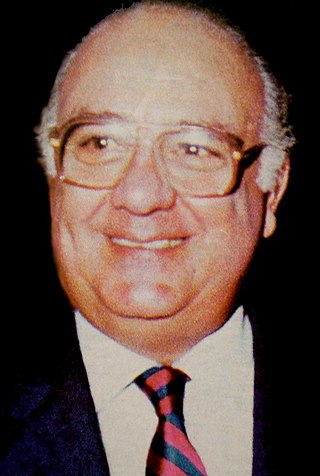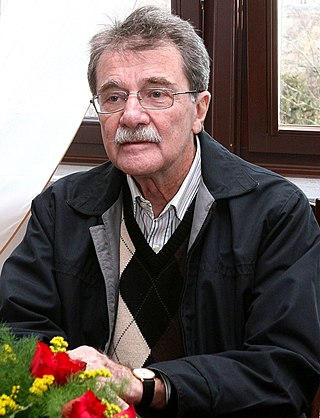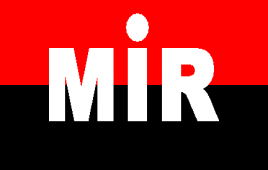
Jaime Ramón Lusinchi was the president of Venezuela from 1984 to 1989. His term was characterized by an economic crisis,growth of the external debt,populist policies,currency depreciation,inflation and corruption that exacerbated the crisis of the political system established in 1958.

Elections in Venezuela are held at a national level for the President of Venezuela as head of state and head of government,and for a unicameral legislature. The President of Venezuela is elected for a six-year term by direct election plurality voting,and is eligible for re-election. The National Assembly (Asamblea Nacional) has 277 members (diputados),elected for five-year terms using a mixed-member majoritarian representation system. Elections also take place at state level and local level.

Democratic Action is a Venezuelan social democratic and centre-left political party established in 1941. The party played an important role in the early years of Venezuelan democracy,leading the government during Venezuela's first democratic period (1945–1948). A decade of dictatorship under Marcos Pérez Jiménez followed,which saw AD excluded from power. With the advent of democracy in 1958,four Presidents of Venezuela came from Acción Democrática from the 1950s to the 1990s during the two-party period with COPEI.

The Movement for Socialism is a democratic socialist political party in Venezuela.

Teodoro Petkoff Malec was a Venezuelan politician,economist and journalist. One of Venezuela's most prominent politicians on the left,Petkoff began as a communist but founded the democratic socialist Movement Toward Socialism party after the 1968 Warsaw Pact invasion of Czechoslovakia. Petkoff was elected as senator and ran for the presidency twice in the 1980s,being defeated both times. As Minister of Planning,he oversaw President Rafael Caldera's adoption of liberalization economic policies in the mid-1990s. He was a prominent critic of President Hugo Chávez and was a candidate to run against him in the 2006 presidential election until he dropped out four months before the vote to support Manuel Rosales. Petkoff launched the newspaper Tal Cual in 2000 and remained its editor until his death in 2018.

The Supreme Court of Justice of Venezuela was Venezuela's highest court until the 1999 Constitution of Venezuela replaced it with the Supreme Tribunal of Justice.

The Republic of Venezuela,also sometimes referred to as the Fourth Republic of Venezuela[es],was a democratic republic first established in 1953,and replaced in 1999 by the Bolivarian Republic of Venezuela. Venezuela saw ten years of military dictatorship from 1948 to 1958. After the 1948 Venezuelan coup d'état brought an end to a three-year experiment in democracy,a triumvirate of military personnel controlled the government until 1952,when it held presidential elections. These were free enough to produce results unacceptable to the government,leading them to be falsified and to one of the three leaders,Marcos Pérez Jiménez,assuming the Presidency. His government was brought to an end by the 1958 Venezuelan coup d'état,which saw the advent of democracy with a transitional government under Admiral Wolfgang Larrazábal in place until the December 1958 elections. Prior to the elections,three of the main political parties,Acción Democrática,COPEI and Unión Republicana Democrática,with the notable exclusion of the Communist Party of Venezuela,signed up to the Puntofijo Pact power-sharing agreement.

The history of Venezuela reflects events in areas of the Americas colonized by Spain starting 1502;amid resistance from indigenous peoples,led by Native caciques,such as Guaicaipuro and Tamanaco. However,in the Andean region of western Venezuela,complex Andean civilization of the Timoto-Cuica people flourished before European contact.
The Democratic Republican Union is a Venezuelan political party founded in 1945.

The Revolutionary Left Movement was a left-wing Marxist political party in Venezuela. It split from Acción Democrática in 1960 and became involved in armed guerrilla struggle against the Venezuelan state.
The first presidency of Carlos Andrés Pérez coincided with the oil boom of 1974,which saw Venezuela's economy prosper. Carlos Andrés Pérez launched a program of rapid modernization. His first presidency also saw the nationalization of the oil industry. He regained the presidency in 1988.

The first presidency of Rafael Caldera took place from 1969 to 1974. He was elected by only 33,000 votes. He was sworn in as president in March 1969—the first time in the country's 139-year history that an incumbent government peacefully surrendered power to the opposition.

The second presidency of Rafael Caldera took place from 1994 to 1999. Caldera had previously been President from 1969 to 1974.
El Trienio Adeco was a three-year period in Venezuelan history,from 1945 to 1948,under the government of the popular party Democratic Action. The party gained office via the 1945 Venezuelan coup d'état against President Isaías Medina Angarita,and held the first democratic elections in Venezuelan history,beginning with the 1946 Venezuelan Constituent Assembly election. The 1947 Venezuelan general election saw Democratic Action formally elected to office,but it was removed from office shortly after in the 1948 Venezuelan coup d'état.
A military dictatorship ruled Venezuela for ten years,from 1948 to 1958. After the 1948 Venezuelan coup d'état brought an end a three-year experiment in democracy,a triumvirate of military personnel controlled the government until 1952,when it held presidential elections. These were free enough to produce results unacceptable to the government,leading them to be falsified,and to one of the three leaders,Marcos Pérez Jiménez,assuming the Presidency. His government was brought to an end by the 1958 Venezuelan coup d'état which saw the advent of democracy,with a transition government under Admiral Wolfgang Larrazábal in place until the December 1958 elections. Prior to the elections,three of the main political parties signed up to the Punto Fijo Pact power-transition agreement.
Between 1908 and 1958,the Republic of Venezuela saw several changes in leadership,including a coup d'état in 1948. The period also found the country discover its petroleum deposits,which has had a major effect on the economy of Venezuela

Luis Herrera Campins served as President of Venezuela from 1979 to 1984. Prior to his election,he founded the moderately conservative Christian COPEI party. He was succeeded by Jaime Lusinchi.
JoséAgustín CataláDelgado was a Venezuelan journalist and author.
Blanca Alida Ibáñez Piña is a Venezuelan private secretary and widow of former President Jaime Lusinchi. She is the daughter of María del Rosario Piña and Carlos Julio Ibáñez.
Gladys Teresa Castillo Cardier was a Venezuelan pediatrician and social activist. She was the First Lady of Venezuela from 1984 until her divorce from President Jaime Lusinchi in 1988. Lusinchi's controversial divorce from First Lady Castillo,in favor of his mistress and private secretary Blanca Ibáñez,was a major public and political scandal during his presidency.















